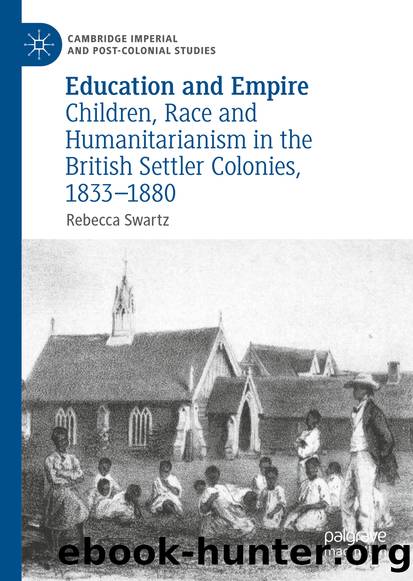Education and Empire by Rebecca Swartz

Author:Rebecca Swartz
Language: eng
Format: epub
ISBN: 9783319959092
Publisher: Springer International Publishing
Conclusion: Forgotten, Neglected, Ignored?
The schemes for African education in Natal were related to broader thinking about the relationship between race, civilisation and labour. The attempts of Commissioners to either isolate or amalgamate the African population spoke to competing visions of the colonyâs future, with Africans either retaining a relative degree of autonomy within native locations, or being incorporated as wage labourers into white society. Competing and conflicting discourses of humanitarianism and settler colonialism shaped the responses of the local government to calls for either increased access to land and funds for education, or settler concerns over this spending. The imperial government remained ostensibly committed to its humanitarian agenda during this period, in spite of their unwillingness to spend on native education. They continued to be suspicious of the local governmentâs ability to manage the settler populations, as the correspondence regarding the Native Reserve Fund indicates. In this context, the local government reframed the colonial endeavour as a teaching opportunity. Rather than promoting industrial training as simply creating labourers, the generation of new labour was seen as a by-product of an inherently sympathetic, improving system, designed to elevate the moral character of Africans. There were exceptional cases in which Africans were provided high quality education in mission schools, for example, at the American missions of Adams and Inanda Colleges, or in Bishop Colensoâs short-lived Ekukhayeni school, which I discuss in more detail in the next chapter. However, the local government and settlers primarily promoted a version of education that bolstered their own power.
The perceived competition between settlers and Indigenous people was fundamental to access to education in the mid-nineteenth century. Settlersâ sense of their vulnerability and their desire to be recognised as equal to those living in Britain, meant that they continued to push for their rights to land and labour to be recognised, to the detriment of the local population. The settler colonial contexts of Natal, Western Australia and elsewhere, had a profound influence on the nature of education provided to Indigenous people. Although there were resonances between schemes for training freed people in the Caribbean and education programmes in the settler colonies, there were also ways in which particular settler concerns over Indigenous childrenâs education were articulated in the settler colonies. At the heart of these concerns were fears about how Indigenous people, when educated, might mount critiques of colonialismâin some scenarios, settlers feared, leading to rebellion. In spite of the reassurances of government that the settlersâ safety was their foremost priority, settlers across the empire maintained a level of suspicion towards the Indigenous population, particularly when they were being provided with resources from the colonial government that were believed to be in short supply. In Natal, the attempts on behalf of the imperial government to âprotectâ, âimproveâ or âciviliseâ Indigenous people were met with attempts to curtail spending on Africansâ education. These were often framed in terms of settlersâ own political sovereignty. Any legislation that did not apply to the âwholeâ population, often taken to mean the settler population, was met with antagonism.
Download
This site does not store any files on its server. We only index and link to content provided by other sites. Please contact the content providers to delete copyright contents if any and email us, we'll remove relevant links or contents immediately.
The Art of Coaching Workbook by Elena Aguilar(48063)
Trainspotting by Irvine Welsh(20054)
Twilight of the Idols With the Antichrist and Ecce Homo by Friedrich Nietzsche(17705)
Fangirl by Rainbow Rowell(7833)
Periodization Training for Sports by Tudor Bompa(7328)
Change Your Questions, Change Your Life by Marilee Adams(6641)
This Is How You Lose Her by Junot Diaz(5770)
Grit by Angela Duckworth(4735)
Red Sparrow by Jason Matthews(4665)
Asking the Right Questions: A Guide to Critical Thinking by M. Neil Browne & Stuart M. Keeley(4574)
Paper Towns by Green John(4169)
Room 212 by Kate Stewart(4106)
Ken Follett - World without end by Ken Follett(3972)
The Sports Rules Book by Human Kinetics(3588)
Housekeeping by Marilynne Robinson(3401)
The Motorcycle Diaries by Ernesto Che Guevara(3332)
Introduction to Kinesiology by Shirl J. Hoffman(3299)
Exercise Technique Manual for Resistance Training by National Strength & Conditioning Association(3291)
Double Down (Diary of a Wimpy Kid Book 11) by Jeff Kinney(3272)
